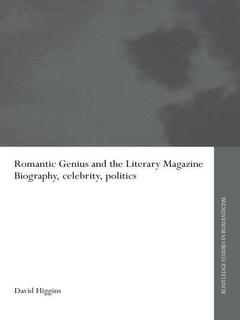Romantic Genius and the Literary Magazine Biography, Celebrity, Politics Routledge Studies in Romanticism Series
Auteur : Higgins David

In early nineteenth-century Britain, there was unprecedented interest in the subject of genius, as well as in the personalities and private lives of creative artists. This was also a period in which literary magazines were powerful arbiters of taste, helping to shape the ideological consciousness of their middle-class readers. Romantic Genius and the Literary Magazine considers how these magazines debated the nature of genius and how and why they constructed particular creative artists as geniuses.
Romantic writers often imagined genius to be a force that transcended the realms of politics and economics. David Higgins, however, shows in this text that representations of genius played an important role in ideological and commercial conflicts within early nineteenth-century literary culture. Furthermore, Romantic Genius and the Literary Magazine bridges the gap between Romantic and Victorian literary history by considering the ways in which Romanticism was understood and sometimes challenged by writers in the 1830s. It not only discusses a wide range of canonical and non-canonical authors, but also examines the various structures in which these authors had to operate, making it an interesting and important book for anyone working on Romantic literature.
David Higgins is a Lecturer in English at University College Chester, and has published articles on Wordsworth, Hazlitt and nineteenth-century constructions of race.
Date de parution : 06-2012
15.6x23.4 cm
Date de parution : 08-2005
15.6x23.4 cm
Thèmes de Romantic Genius and the Literary Magazine :
Mots-clés :
cockney; school; leigh; hunt; poetic; noctes; ambrosianae; lake; poets; marketplace; nineteenth-century Britain; Romantic literary; Romanticism; Victorian literary; literary magazine; Young Man; Sir George Beaumont; Arch Angel; Sweet Oil; George III; Noctes Ambrosianae; Rydal Mount; Contemporary Society; Material Considerations; Illustrious Literary Characters; Cockney School; George Beaumont; Royal Academy; Hogg's Account; Christ's Entry; Hazlitt's Writings; Heroic Genius; Statesman's Manual; Early Nineteenth Century Readers; Wordsworth's Genius; Literary Biography; Eighteenth Century British Theories; Comic Almanack; Female Genius



